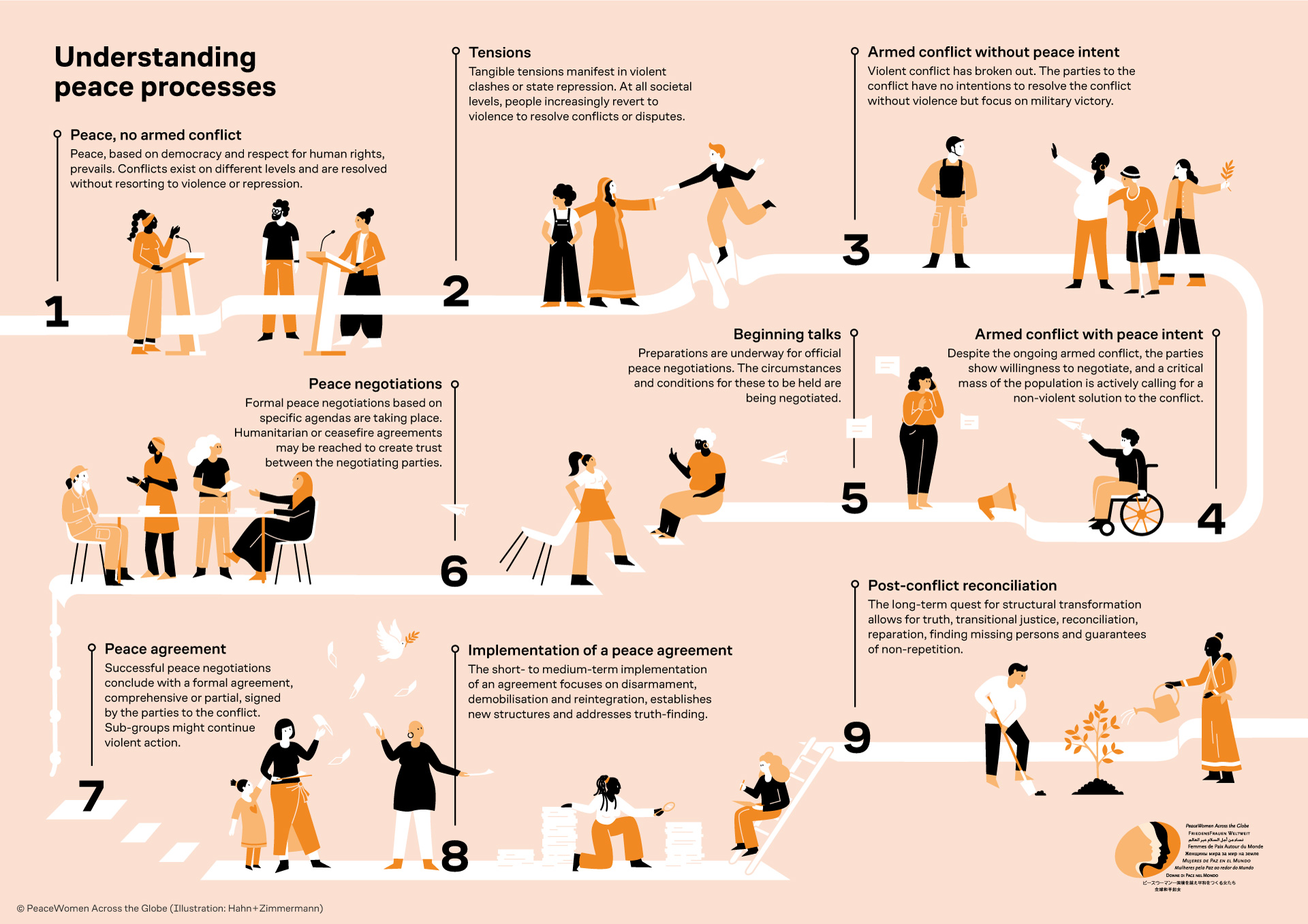Peace processes:
What images do the words "peace processes" evoke in your mind? Do you imagine years of negotiations culminating in a ceremony where the parties to the conflict sign an agreement, followed by a photo of the handshake that goes around the world? We questioned and deconstructed this common perception and took an in-depth look at peace processes focusing on the question: "How do women influence peace processes?’"
Peace processes are never linear but take place in stages or phases that often overlap, without a clear timetable. A peace process is more of a puzzle made up of several successive small steps than a large, meticulously planned attempt to end a conflict based on a manual. At any stage it can go off track – even after a peace agreement has been signed – and suffer setbacks.
The result of our examination of how women influence peace processes is a graphic representation of the different stages of peace processes. This highlights the role women play and where they exert influence to drive the peace process forward and prevent setbacks.
With this instrument we want to illustrate this complexity without claiming to present a universally applicable model. Rather, it is intended to raise questions, facilitate analytical debate and encourage the addition of feminist visions to conventional narratives.
How do women influence peace processes?

The influence of women and their roles in a peace process – they take centre stage in the illustration – are just as diverse as the women themselves. They are not only negotiators, mediators, signatories and facilitators in peace negotiations. From our many years of experience and from working with our partners and peace activists in different contexts, we know that women play diverse roles in all nine stages of the process:
In peace time or in contexts where tensions exist (stages 1-2) – using Brazil and Indonesia as examples – they influence political debate and agendas, recognise potential for conflict and actively prevent the emergence of tensions and clashes or outbreaks of violence.
During an armed conflict (stages 3-4) – using Ukraine as an example – they advocate non-violent conflict transformation and call for peace negotiations and the renunciation of enemy stereotypes. They run contact centres for victims, create trust between the parties to the conflict and promote peace intentions that are acceptable to the majority.
During formal negotiations (stages 5-7) – using the example of Colombia – they demand the inclusion of diverse visions and the participation of women in the talks and formulate gender-equitable provisions.
After the end of a conflict (stages 8-9) – using Nepal and the Philippines as examples – they play a key role in monitoring implementation, winning majorities in favour of peace and taking an active role in truth-finding processes. They lead initiatives for reconciliation and initiate structural change by calling for a critical examination of taboo subjects and non-repetition.
Peace processes include building, negotiating, implementing and maintaining peace. Based on this comprehensive understanding, we advocate for the equal and meaningful participation of women in shaping peace during armed conflicts (stages 3-4), during peace negotiations (stages 5-7) and after armed conflicts (stages 8-9).
Thanks to our experience in these three areas, we can provide our partners with long-term, strategic support to achieve inclusive peace processes and prevent setbacks through our programmes. We act as a financial bridge, advisor and ally and strengthen our partners' capacities and promote exchange between peace activists and women's organisations in different contexts.
At the bottom of this page you can download the illustration and the text that we have prepared as a handout.